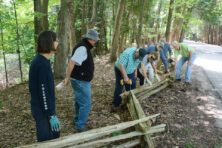City Writing Fence Regulations
- Share
- Tweet
- Pin
- Share

Robert Frost famously decided in his poem “Mending Wall” that good fences make good neighbors. Though that may be true, the City of Sturgeon Bay wants a little more work done before it spells out its version of a good fence in an ordinance.
The issue arose from the city’s Community Protection and Services Committee, chaired by Alder Dan Williams.
“We’ve been grappling with this for about a year,” Williams said. “We weren’t sure how to approach it and wanted to assure we didn’t overstep our boundaries.”
The city does not currently regulate fencing. The new ordinance would provide some basic parameters.
“It’s very uncommon for a community to not have a fence ordinance,” said Christopher Sullivan-Robinson, city planner and zoning administrator. Consequently, some of the fences in Sturgeon Bay are “a little over the top, so it’s good to have some rules.”
The ordinance proposes a maximum height of eight feet, with the finished side facing outward, and some basic setbacks, maintenance and securing methods spelled out.
Existing fences would be grandfathered in, meaning that even if the ordinance were to pass in the future, existing fences would not have to be changed to meet the requirements. But if the fence blew down in a storm?
“There’s no permit required, so it would kind of be the honor system,” Sullivan-Robinson said.
Alder Dennis Statz, who has wooden picket fences on his property built in the 1980s and 1990s, suggested the setbacks be changed and the fencing height made more clear.
“We have an eight-foot fence, and it’s taller because it’s off the ground,” he said.
The council unanimously agreed that the language needs to be further refined and sent the draft ordinance back to the committee.
Amplified Music Being Turned Down
At least during certain hours
The City of Sturgeon Bay is halfway to banning outdoor music and bands between 10 pm and 6 am Sunday – Thursday, and midnight – 6 am Friday and Saturday.
Regulating noise specifically from amplified music came out of the city’s Community Protection and Services Committee, chaired by Alder Dan Williams. Complaints about the downtown business areas have driven the committee’s study of the issue during the past six months.
“We talked with law enforcement to learn where the complaints are coming from, and most are due to amplified noise, music,” Williams said during the Common Council’s Nov. 16 meeting. “So we’ve tried to address that aspect of it and build it around time frames that would be palatable for where those venues take place.”
The city currently regulates noise only in residential areas, with noise that exceeds 90 decibels prohibited during the day and 55 decibels prohibited between 10 pm and 6:30 am. Williams said the committee didn’t attach decibels to the amplified music because the ban would not be limited to residential areas, and industrial uses are woven throughout the city.
The council unanimously approved the first reading of the proposed ordinance Nov. 16, with the second reading slated for the council’s Dec. 7 meeting.
Property Rezoned for Storage Garages
The Common Council approved a second reading to allow a rezoning from agricultural to commercial to pave the way for Estes Investments to construct up to 15 unsewered storage garages on the rezoned back half of a 1.87-acre property at 1361 N. 14th Ave. The garages would be built as they’re individually rented or sold.
The property once held a fruit-processing plant and now contains decrepit buildings, including a trailer that’s inhabited, and numerous junk items stored outside.
A neighbor of the property, Chris Larsen, addressed the Common Council during the first reading of the proposed zoning change at its Nov. 2 meeting. Larsen expressed concern about the current condition of the property and that the future use of storage garages would allow additional outdoor storage. The council approved the first reading of the rezoning with a restriction on outdoor storage, a condition to be reviewed by the city attorney before the second reading.
“He said we can’t do that,” said Marty Olejniczak, community development director, when the issue came up for the second reading Nov. 16. What they could do was not allow the rezoning to take effect until the owner filed a deed restriction prohibiting outdoor storage at the site.
“It would pass legal muster and accomplish what the council wanted on the first reading,” Olejniczak said.
The front part of the property is still zoned for agriculture. The owner intends to build an apartment building on that portion if city sewer and water can be installed at the site. If those plans proceed, the owner would need to go through the rezoning process again for the front property.




